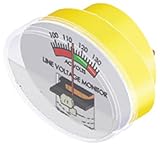CHECK LOWEST PRICES , BEST DISCOUNT and COMPARE PARE PRICES ABOUT Camco 55263 120 V RV Air Conditioner Line Voltage Meter
voltmeter SAVE SHOP-new & used...
CHECK NOW for LOWEST PRICES TODAY!!!
Camco 55263 120 V RV Air Conditioner Line Voltage Meter
voltmeter for BEST SHOPPING PRICES & REVIEW FOR DEALS !!!...

Camco 120 V RV Air Conditioner Line Voltage Meter is designed to plug into any 120V wall receptacle and provides a continuous, accurate reading of the AC line voltage..../ Camco 55263 120 V RV Air Conditioner Line Voltage Meter / voltmeter

- Designed to plug into any 120V wall receptacle and provide a continuous, accurate reading of the AC line voltage
- Provides a continuous, accurate reading of the AC line voltage
- Adaptive and easy to install
- Consistent and accurate
- Easy to read scale

BEST DISCOUNT Camco 55263 120 V RV Air Conditioner Line Voltage Meter
voltmeter for BEST DEALS PRICES & REVIEW : !!!...
Model Of Item : 55263
Product Brand : Camco
Product Rating : |
 |
Popular Rating : |

|
Reviews Rating : |
 |
Customer Rating : |
 |
Available : In Stock


If this Information is Not Updated, Please Check!!!

Camco 55263 120 V RV Air Conditioner Line Voltage Meter
voltmeter
Guests who viewed this item ultimately bought...
Camco 55263 120 V RV Air Conditioner Line Voltage Meter
voltmeter for ALL BUY BEST BEST SELLER!!!
voltmeter
Special for Best deals
Customer Review :
Does not meet even low expectations : Camco 55263 120 V RV Air Conditioner Line Voltage Meter
It's an AC Voltage meter... not too much more to say, but I will anyway:
1) Good: Allows the 2nd outlet to be used when plugged into a duplex.
2) Good: The marked "good" voltage range is a little conservative -- most RV's can tolerate down to 107-108V, where this would warn you not to go below about 112V.
3) Improvement: RVs are often less than perfectly lit (particularly because of overhead lighting and cabinetry that puts outlets into shaded corners). A great improvement to this meter would be a simple LED or neon lamp to make it glow for readability. I'll be modding mine to have this, but it would be a cheap addition at the factory.
4) REALLY great improvement: At least so far, I've never seen one of these meters with a voltage ALARM on it. Yes, beyond the scope of this inexpensive meter, but would be a great addition to this "concept" of monitoring input voltage. Voltage is often fine when I set up, and then other campers draw down the current later on -- it would be nice to be actively warned when the voltage has dropped.
Somewhat related fantastic idea I just have to share here:
I started to often travel with a laptop, and then other electronics, and as a result started to carry a computer UPS to protect them from questionable power supplies (UPS = Uninterruptable Power Supply -- a charger/battery/inverter combination that takes over AC supply when the power goes bad or off). Brainstorm! This simple (and fairly cheap!) device:
1) AUTOMATICALLY monitors the voltage (as well as sine waveform), and takes over the AC if power is too weak or wobbly.
2) It DOES have an alarm for voltage to warn you when it had to take over.
3) Light AC Power: When I "dry camp" without external 120V AC, it uses the RV's house battery to run everything except the 30A Air Conditioner.
4) Traveling power: My refridge is a cheaper one that runs on AC or LP, but not 12V... so while I'm driving, it's eating LP. With the UPS in the circuit, my truck powers the UPS which powers the fridge as if it was on shore power. PERFECT! And ENORMOUSLY cheaper than upgrading the fridge to a 3-way power model!
5) FREE UPGRADE: Little known secret: Most offices don't bother to change the batteries in the UPS's they have for employees, since complete new units are not much more than the replacement batteries. This means most IT departments have stacks of UPS's with older/worn out batteries. Used in an RV as I do, I don't care about the "little" battery the UPS came with anyway, and tap the unit into my main bank of house batteries instead. This means that all the above benefits could be yours for FREE if you ask your IT department for worn out UPS units. The electronics are WAY WAY better than the charger built into your trailer (they won't overcharge and boil your house battery, for example), and allow precise monitoring of charge and discharge cycles. UPS's are rated by how much wattage (V*A) they put out when on battery -- a 500VA model will run any light AC appliances, and I use a 1000VA to be able to use my 800W microwave on the UPS. More output power than that would probably just drain your batteries unnecessarily fast. ENJOY!

